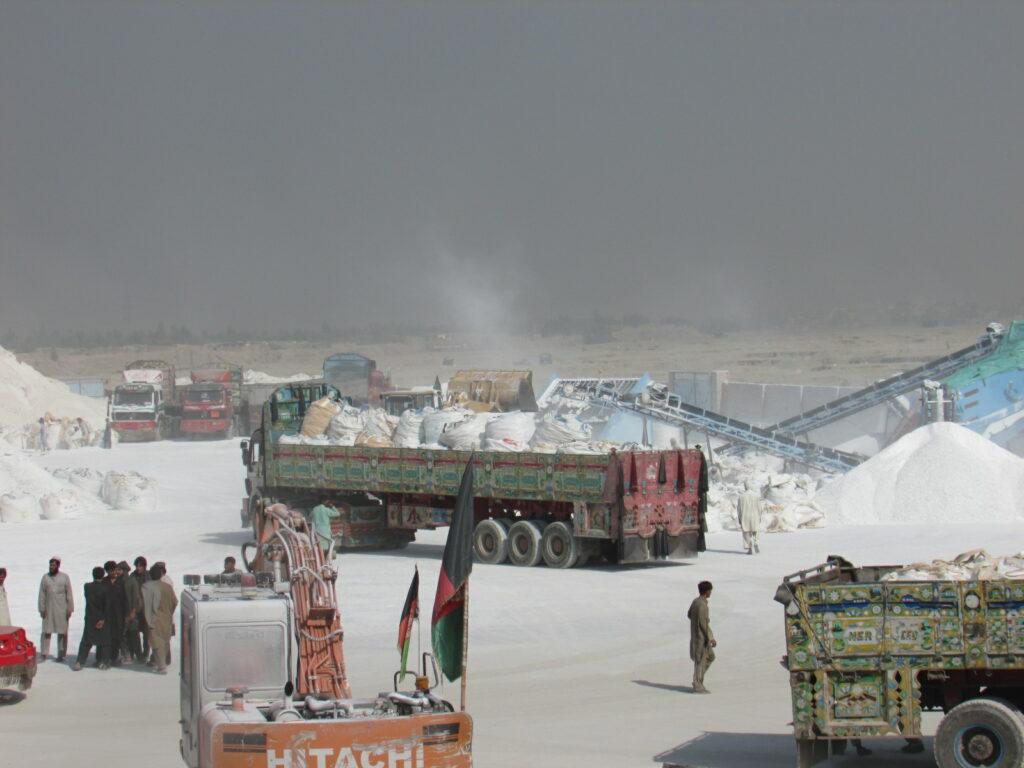JALALABAD (Pajwhok): Pajhwok Afghan News findings show the Ministry of Mines and Petroleum (MoMP) has temporarily allowed transfer of slate stones in Nangarhar province after around a year-long suspension of the process.
Owners of companies and factories involved in slate stones extraction and process have rejected the MoMP decision and said that the move could harm investors and traders and thousands of people working in the industry would lose their jobs.
In March 2020, National Procurement Commission in a meeting cancelled slate stones contracts with companies and stopped processing and transporting of the stones.
Mohammad Aziz Gharwal, spokesman of MoMP, told Pajhwok Afghan News that 23 areas containing slate stones were awarded to the private sector between 2012 and 2017.
These contracts were awarded based on conditions that the companies should activate standard processing centers, but MoMP’s evaluation showed the companies did not comply with the conditions while the terms of some other companies had ended which were the reasons the ministry cancelled the contracts, he said.
However, Nangarhar Slate Association says the contracts were cancelled without any valid reasons as the terms of the companies had not ended.
The ministry had said that one of the reasons of the contracts’ cancellation was to facilitate a single contract for all slate stones extractions and processing and preventing corruption in the process.
In May 2019, MoMP had said that High Economy Council in a meeting organized in the Presidential Palace, former mines and petroleum minister, Nargis Nehan had presented exploration and process plan of Shirzad Block of slate stones.
After the council’s review, the plan was approved and it was decided to talk with top companies in the list of MoMP for bidding.
Based on the contract, the company should have invested $15 million in slate exploration, extraction and implementation.
The company was also made responsible to create jobs for local people and better manage the mining process for generating higher revenue to the government.
However, Nangarhar Slate Association officials said that creating a big contract was not applicable in a country like Afghanistan as the ministry failed to implement such a plan in three years.
Delawar Jarnil, head of Nangarhar Slate Association, told Pajhwok Afghan News that 38 companies of slate mining and 24 factories of slate processing were present in the province.
He said that 24,000 people would work in the mentioned factories and companies, but all these people lost their jobs after contracts with the companies cancelled.
Besides loss of jobs, the decision also caused millions of dollars loss to traders and factory owners, he said.
He added that 700,000 tons of extracted slate stones awaited transportation but MoMP recently allowed temporarily transport of the stones which he said was very limited period.
He said that the slate stones located in six areas of the province required first transfer to factories for processing and then shifted to markets which required a long period of time.
Jarnil said that despite they were permitted by the ministry to transfer the slate stones, but Nangarhar police chief and Torkham commissar temporarily stopped them from working.
Nangarhar police chief, Col. Jumma Gul Hemmat said that they stopped the process only for legal procedure and due to high load of vehicles that could damage roads.
Acting interior minister, Hayatullah Hayat who visited Nanarhar said that no one would be allowed to illegally transfer or process slate stones.
But the slate association members said the police chief and other officials were making such excuses in order to seek bribe.
The association head said currently half a million tones of extracted slate stone remained unmoved for the last one and a half years and their transfer was not allowed.
However, the Ministry of Mines and Petroleum in a meeting of the High Economic Council chaired by the president decided to allow the trading and processing of talc in certain areas for one month.
The resolution of the High Economic Council said a joint delegation of the Ministry of Mines and Petroleum, the Presidential Investment Unit, and the Presidential Legal Unit visited Nangarhar and at the request of representatives of the Nangarhar Chamber of Commerce, the Nangarhar Talc Association, talc miners, tribal elders and youth, they issued licenses to sell and process talc.
The spokesman for the Ministry of Mines said that the sale and processing of talc had been temporarily allowed for a month, adding that talc was left in some localities and factories. The government decided to follow up the matter through a multilateral delegation and authorize the Ministry of Mines to process and sell the remaining talc.
He added that the delegation had proved the location and volume of the extracted stone and was given only one month to process and transport the mineral.
The Ministry of Mines and Petroleum (MoMP) has said that it has started blocking the re-awarding of talc-rich areas, which will be awarded after approval by the Economic High Council.
But traders say the volume of slate stone allowed to be processed and transported makes up 10 percent of the total stone extracted, and they are demanding that Sherzad’s extracted stone be allowed as well.
The traders and factory owners of Nangarhar Shokani Association have invested around $80 million in the province. They say if facilities could not be provided to them in the face of severe insecurity, problems should also be created for them.
mds/ma








GET IN TOUCH
NEWSLETTER
SUGGEST A STORY
PAJHWOK MOBILE APP